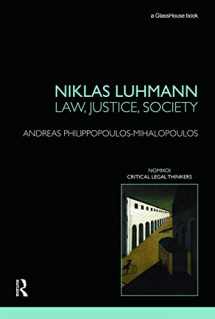
Niklas Luhmann: Law, Justice, Society (Nomikoi: Critical Legal Thinkers)
ISBN-13:
9780415685283
ISBN-10:
0415685281
Author:
Andreas Philippopoulos-Mihalopoulos
Publication date:
2011
Publisher:
Routledge
Format:
Paperback
248 pages
Category:
Jurisprudence
,
Legal Theory & Systems
,
Law Specialties
,
Sociology
FREE US shipping
Book details
ISBN-13:
9780415685283
ISBN-10:
0415685281
Author:
Andreas Philippopoulos-Mihalopoulos
Publication date:
2011
Publisher:
Routledge
Format:
Paperback
248 pages
Category:
Jurisprudence
,
Legal Theory & Systems
,
Law Specialties
,
Sociology
Summary
Niklas Luhmann: Law, Justice, Society (Nomikoi: Critical Legal Thinkers) (ISBN-13: 9780415685283 and ISBN-10: 0415685281), written by authors
Andreas Philippopoulos-Mihalopoulos, was published by Routledge in 2011.
With an overall rating of 4.5 stars, it's a notable title among other
Jurisprudence
(Legal Theory & Systems, Law Specialties, Sociology) books. You can easily purchase or rent Niklas Luhmann: Law, Justice, Society (Nomikoi: Critical Legal Thinkers) (Paperback) from BooksRun,
along with many other new and used
Jurisprudence
books
and textbooks.
And, if you're looking to sell your copy, our current buyback offer is $0.3.
Description
Niklas Luhmann: Law, Justice, Society presents the work of sociologist Niklas Luhmann in a radical new light. Luhmann’s theory is here introduced both in terms of society at large and the legal system specifically, and for the first time, Luhmann’s texts are systematically read together with theoretical insights from post-structuralism, deconstruction, phenomenology, radical ethics, feminism and post-ecologism. In his far-reaching book, Andreas Philippopoulos-Mihalopoulos distances Luhmann’s theory from its misrepresentations as conservative, rigorously positivist and disconnected from empirical reality, and firmly locates it in a sphere of post-ideological jurisprudence. The book operates both as a detailed explanation of the theory’s concepts and as the locus of a critique which brings forth Luhmann’s radical credentials. The focal points are Luhmann’s concept of society and the law’s paradoxical connection to justice. However, these concepts are also transgressed in order to show how the law deals with the illusion of its identity, and more broadly how the theory itself deals with its limitations. This is illustrated by examples drawn from human rights, constitutional theory and ecological thinking. On the whole, Niklas Luhmann: Law, Justice, Society serves both as an introductory text and as a critical response to Luhmann’s theory, and is recommended reading for students and researchers in sociology, law, social sciences, politics and whoever is interested in seeing the influential work of Niklas Luhmann from a critical new perspective.


We would LOVE it if you could help us and other readers by reviewing the book
Book review

Congratulations! We have received your book review.
{user}
{createdAt}
by {truncated_author}


